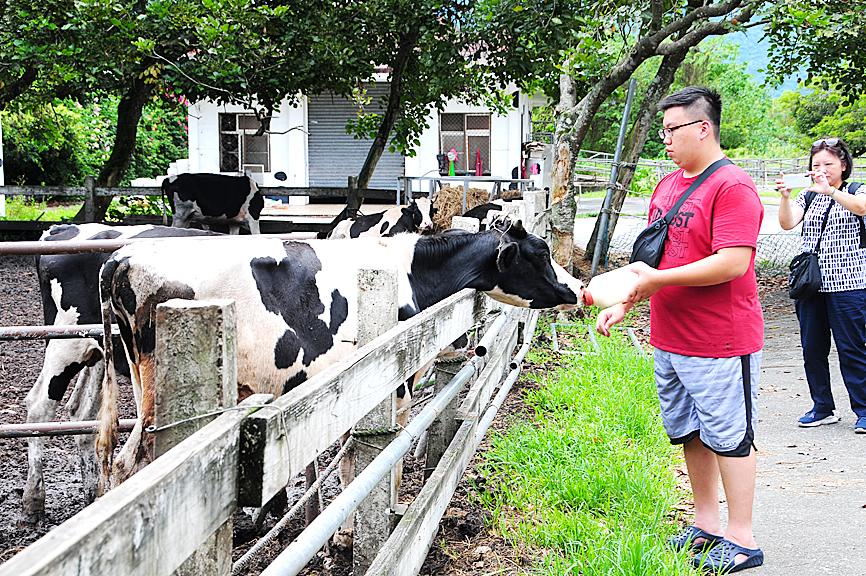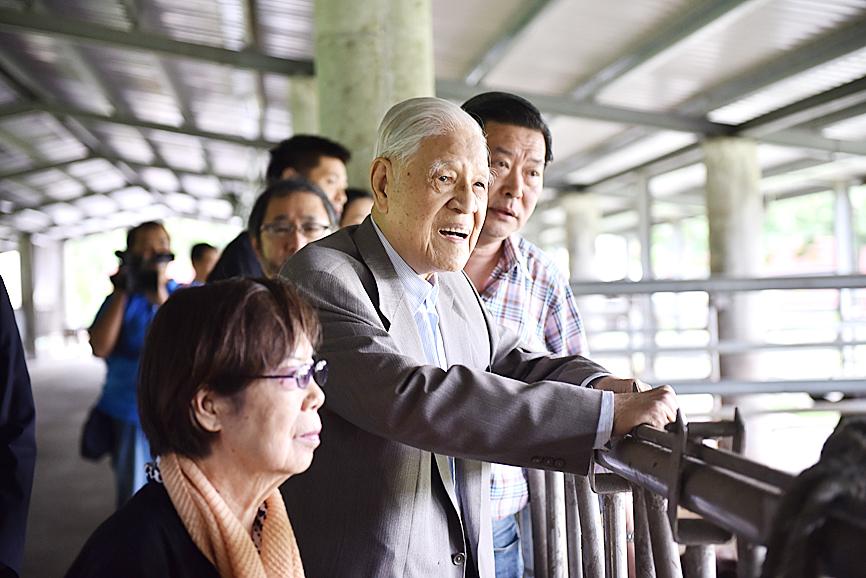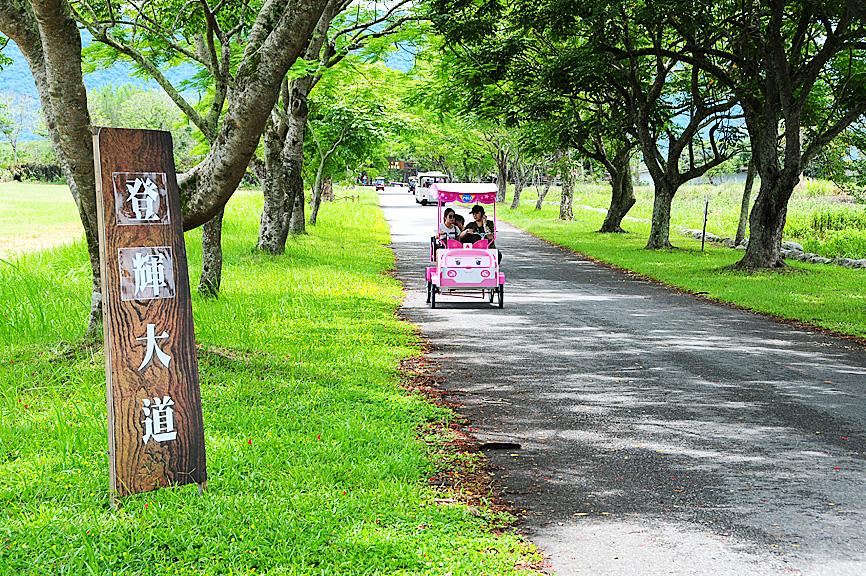Late president Lee Teng-hui (李登輝) fulfilled many political wishes during his lifetime, not least of which was securing democracy for Taiwan, but one remained — transforming the nation’s beef industry.
Lee hoped to achieve this by developing a Taiwanese breed of cattle that was better than Japanese breeds, known for their prime quality meat.
In 2016, Lee, who held a doctorate in agricultural economics from Cornell University, purchased 19 heads of cattle which had been put out to pasture on the Qingtiangang (擎天崗) grassland of Yangmingshan National Park in Taipei.

Photo: Hua Meng-ching, Taipei Times
The cattle were later verified as an ancestor breed of Tajima, a native Japanese breed brought to Taiwan during World War II.
They were transported to a dairy farm in Hualien County, with clean air and vast grassland, which Lee selected to fulfill his retirement “dream” of breeding Taiwanese prime beef cattle, the Lee Teng-hui Foundation said.
At the farm, Lee carried out his ambitious plan of developing a breed he called Yuansing (源興), using molecular breeding technologies, former Council of Agriculture (COA) minister Chen Bao-ji (陳保基) said.

Photo: Hua Meng-ching, Taipei Times
Chen said that Lee had great hopes for Taiwan’s beef industry.
Working with Taiwanese universities and professionals in Japan, Lee’s team used advanced technologies to test the quality of the cattle and analyze their DNA, while breeding cattle adapted to the local climate, Chen said.
Lee did not just want to breed Taiwan-exclusive prime beef cattle, he wanted to “thoroughly transform Taiwan’s beef industry,” Chen said.

Photo: Hua Meng-ching, Taipei Times
Yu Mei-yun (游美雲), a manager at Harvest Ranch in Hualien’s Fenglin Township (鳳林), said that Lee’s breeding project had been a top secret kept by a professional team.
In the past few months, no dairy farm employees have been permitted to enter the cowsheds housing the Yuansing because of the COVID-19 pandemic, she said.
However, Lee’s team helped nurse 300 milk cows at the farm, raising their output, which in turn made a fortune for the farm, Yu said.
Since 2016, Lee, despite being in his 90s, visited the farm every year for three consecutive years, she said, adding that he carefully inspected every breeding detail in person, she added.
Lee had planned a visit again early this year, but it was canceled after he fell ill, Yu said.
In honor of Lee, Harvest Ranch on Friday changed the name of its main road — near the ranch’s largest patch of grassland — to “Teng-hui Boulevard” (登輝大道).
Chen praised Lee’s efforts to transform the nation’s agricultural sector, pushing the traditional agricultural industries to use modern farming technologies.
In 1997 — when the pork industry was hit by foot-and-mouth disease, resulting in the mass slaughter of hogs — the predecessor to the COA, with Lee’s support, encouraged small hog farms near water conservation areas to withdraw from the industry, Chen said.
The policy was aimed at reducing water pollution caused by pig farming, while bringing technology to improve the bigger farms, Chen said.
While governor of the then-Taiwan Provincial Government, from 1981 to 1984, Lee initiated a policy to cultivate 80,000 professional farmers to produce enough crops to support the nation’s rural economy, former COA official and Tainan deputy mayor Hsu Han-chin (許漢卿) said.
Many follow-up measures, including promoting Taiwan to join the General Agreement on Tariffs and Trade and the WTO, helped Taiwan’s agriculture industry connect with international markets, he added.
Many residents of Luye Township (鹿野), in agriculture-dominated Taitung County, remembered Lee as the “parent of rural villages,” who revived a local tea-producing village in the area, former Luye Farmers’ Association executive Pan Yun-feng (潘永豐) said.
On April 9, 1982, Lee visited Yongan Village (永安), which grew oolung tea. Several days later, he named the locally produced tea “fulu tea” (福鹿茶), which made it famous, Pan said.
At peak production, 80 percent of Yongan villagers were involved in growing and producing tea, with children picking tea stems to earn pocket money, women picking tea leaves in gardens and men producing tea, Pan said.
“The crop has become prosperous,” Pan added.
The tea industry continues to flourish in the Luye area with new products, including the so-called “red oolong” developed in 2007, Pan said.
Recalling that Lee had visited the Luye tea-growing area six times, with the last visit in 2014, Pan said the former president asked for fulu Tea every time he stayed at a local hotel.
Lee had even planted a tree at the hotel and named it “Taiwan Everlasting Tree.”
“He always thought about the farmers,” Pan said.

The manufacture of the remaining 28 M1A2T Abrams tanks Taiwan purchased from the US has recently been completed, and they are expected to be delivered within the next one to two months, a source said yesterday. The Ministry of National Defense is arranging cargo ships to transport the tanks to Taiwan as soon as possible, said the source, who is familiar with the matter. The estimated arrival time ranges from late this month to early next month, the source said. The 28 Abrams tanks make up the third and final batch of a total of 108 tanks, valued at about NT$40.5 billion

Two Taiwanese prosecutors were questioned by Chinese security personnel at their hotel during a trip to China’s Henan Province this month, the Mainland Affairs Council (MAC) said yesterday. The officers had personal information on the prosecutors, including “when they were assigned to their posts, their work locations and job titles,” MAC Deputy Minister and spokesman Liang Wen-chieh (梁文傑) said. On top of asking about their agencies and positions, the officers also questioned the prosecutors about the Cross-Strait Joint Crime-Fighting and Judicial Mutual Assistance Agreement, a pact that serves as the framework for Taiwan-China cooperation on combating crime and providing judicial assistance, Liang

A group from the Taiwanese Designers in Australia association yesterday represented Taiwan at the Midsumma Pride March in Melbourne. The march, held in the St. Kilda suburb, is the city’s largest LGBTQIA+ parade and the flagship event of the annual Midsumma Festival. It attracted more than 45,000 spectators who supported the 400 groups and 10,000 marchers that participated this year, the association said. Taiwanese Designers said they organized a team to march for Taiwan this year, joining politicians, government agencies, professionals and community organizations in showing support for LGBTQIA+ people and diverse communities. As the first country in Asia to legalize same-sex

MOTIVES QUESTIONED The PLA considers Xi’s policies toward Taiwan to be driven by personal considerations rather than military assessment, the Epoch Times reports Chinese President Xi Jinping’s (習近平) latest purge of the Chinese People’s Liberation Army (PLA) leadership might have been prompted by the military’s opposition to plans of invading Taiwan, the Epoch Times said. The Chinese military opposes waging war against Taiwan by a large consensus, putting it at odds with Xi’s vision, the Falun Gong-affiliated daily said in a report on Thursday, citing anonymous sources with insight into the PLA’s inner workings. The opposition is not the opinion of a few generals, but a widely shared view among the PLA cadre, the Epoch Times cited them as saying. “Chinese forces know full well that